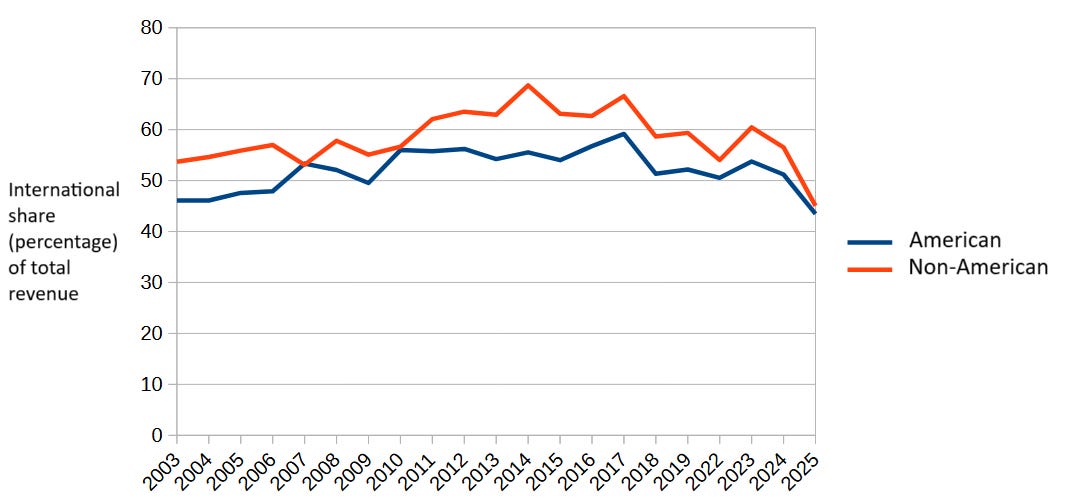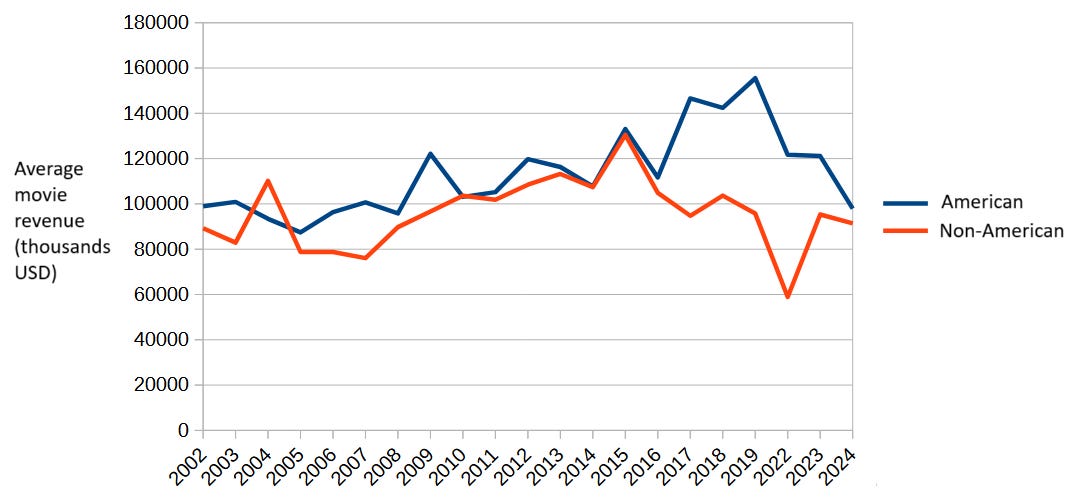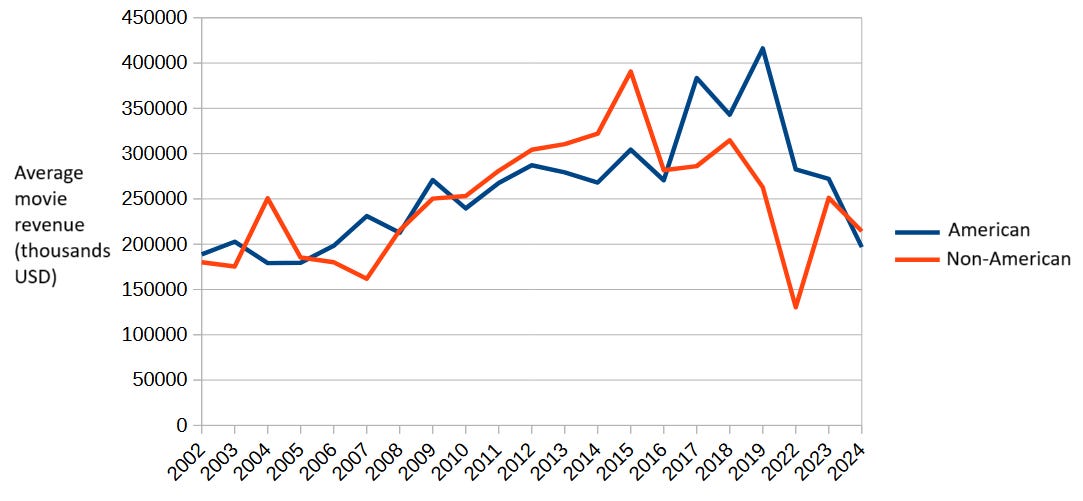Do foreign film directors outperform American ones in international markets due to selection effects?
Answering comments on American soft power revisited.
As a minor Substack writer I’m always pleasantly surprised when people engage with and react to my posts, whether with criticism or praise. One of my goals with this blog is to learn and to spark discussion on the subjects I write about; comments, Substack messages and X DMs are always welcome.
Therefore, I was happy to see Alan Perlo - who writes a very interesting Substack of his own - raise a good point regarding my American soft power revisited post, where I stated that American film directors are less appealing to international audiences than non-American directors:
As far as I know, the top-grossing films that do historically do well internationally are action and franchise movies where dialogue, social commentary and well-crafted humor are less important, because executing these things well depends a lot on the background and tastes of a specific national audience and can be literally "lost in translation". To most moviegoers, what sways them in watching a film at the cinema is what piece of IP it is based on, not whichever director was hired to direct that specific franchise installment. With that being said, the graph you have does show a trend of international directors outperforming American ones. Perhaps making it to Hollywood for a foreign director requires more initiative and skill than reaching it as an American director.
This is a sensible objection to my argument that the higher box office of movies directed by non-Americans compared to those directed by Americans might be due to cultural differences.
If foreign directors face greater challenges when trying to break into the largest and most dynamic cinema industry in the world, then only a small and very skilled fraction of non-American directors, a highly selected group, will make it.
My first intuition when pondering this argument was that foreign directors make more money for Hollywood studios in international markets but less money in the domestic (U.S. and Canada) market, therefore they are not necessarily more skilled than their American colleagues.
Then I realized that foreign directors’ higher international revenue share (a relative measure) doesn’t necessarily result in lower domestic revenues than American directors in absolute terms. Maybe foreign directors are more skilled, and Hollywood hires them because they can generate the same (or more) revenue domestically while at the same time increasing Hollywood’s international box office compared to what an American director would bring in.
It would be interesting to look at how American directors do compared to foreign directors in the domestic market box office. I have a feeling that say in the 90s, when comedy and mid-budget movies had a larger share of the box office, American directors might have brought in more money than they do today because they specialized in movies that only did good business domestically.
This made me realize I needed to compare the domestic box office of American and foreign directors to evaluate whether differences in skill could explain the gap in international share of revenue between one group of film directors and the other.
Let’s remind the gap. Here’s the chart showing the percentage of total revenue that comes from international markets for both groups.

As we’ve seen before, non-American directors consistently derive a higher percentage of revenue from international markets, though this pertains to the share of the total (domestic and international) amount.
Now, let me show you a similar chart, this time plotting the average domestic revenue of films directed by American and foreign directors.

Foreign directors consistently bring in less revenue from the domestic market (U.S. and Canada) than American directors. Furthermore, the gap between American and non-American directors appears to have widened in the last few years, post-2016.
This doesn’t refute the hypothesis that foreign directors could be highly selected. Even if they make less money in the domestic market, their higher international revenue share means they could make up for it in the international market, generating more revenue than American directors overall.
Perhaps Hollywood selects foreign directors who will maximize revenue regardless of which market that revenue comes from?
We should be able to determine whether that is true by looking at the total average movie revenue for American and foreign directors.

Well, there’s no discernible pattern in the above chart. Averaging across the whole time period (21 years) reveals that films directed by Americans earn slightly more than those directed by non-Americans, 261MM compared to 248MM; thus, if anything, the total (domestic and foreign) average revenue figures suggest American directors are more profitable for Hollywood. And yet, around 30% of films are directed by non-Americans.
Why do Hollywood studios frequently choose non-American directors over American ones? Because there’s a lot of variance in the amount of revenue generated within each group, and studios probably base their selections on the individual merits of each director, disregarding any potential skew toward international revenue that non-American directors might cause.
That seems to me the most plausible explanation.
This result makes me think that the selection process for foreign directors is no more rigorous - beyond the obvious, such as English proficiency - than for American ones.
Which is what I expected. I would be very surprised to find a result implying Hollywood studios are systematically making bad decisions and losing money as a consequence. Studios selecting and employing directors with the goal of maximizing profits aligns with my priors.

